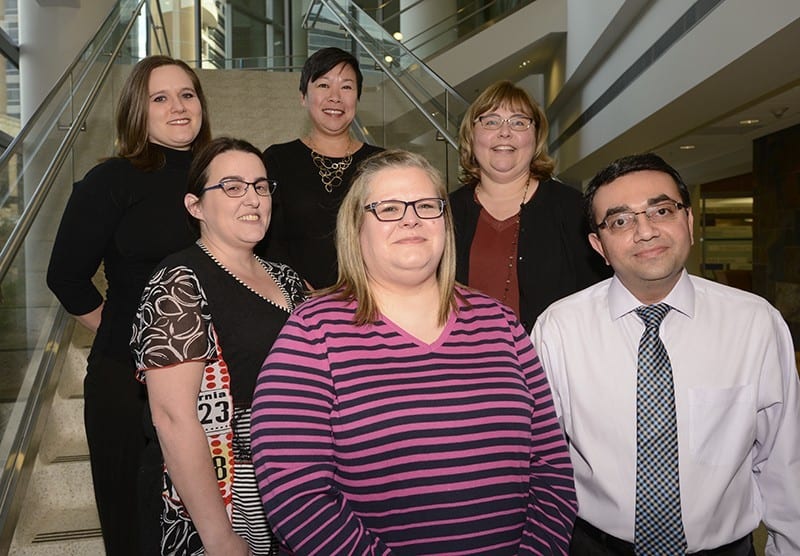Research Support Offices Become Holiday Heroes for Leukemia Patient
| Feb. 1, 2016 | It was Christmas night and Yogesh Jethava, M.D., was worried.
Working the holiday at UAMS Medical Center, he had just diagnosed a leukemia patient’s rare, life-threatening liver disease. The only known treatment was a drug awaiting U.S. Food & Drug Administration approval and not available at most medical centers.
What he thought would be a straightforward emergency-use request to the pharmaceutical company that developed the drug, turned into a near impossible hurdle when he was told that UAMS would have to go through the complex process of opening a clinical trial to receive the drug.
That’s when an extraordinary effort by dedicated UAMS employees from multiple offices began to unfold.
Opening a clinical trial typically takes months, and UAMS’ research support offices were closed for the long holiday weekend. Although Jethava had alerted the appropriate people, he wasn’t expecting what happened next.
While most people were busy sampling leftover pie Christmas night, UAMS’ Sandy Annis and Jennifer Roberts were at their home computers catching up on work.
Annis, who leads the Clinical Trials Office for the Winthrop P. Rockefeller Cancer Institute, saw Jethava’s request in an email from Roberts, director of the Research Pharmacy.
“Jennifer and I have worked together for so long she knew who to contact,” Annis said. “Luckily Jennifer included several of the appropriate people on campus and had already talked to the company.”
The following day Annis completed work on about 30 documents for the drug company. She also drafted an emergency-use informed consent document for the patient to sign. Any hope of getting the clinical trial approved quickly would also require involvement and approval from other UAMS officials, including Suzanne Alstadt, director of the Office of Research and Sponsored Programs, Dori Wong-Scoggins, senior contracts attorney, and Jennifer Holland, director of the Institutional Review Board office.
“In my 12 years in this office, this is the first time we’ve ever attempted to get something like this accomplished on a holiday or a weekend,” Annis said. “Amazingly everybody was on email and they were responsive. The drug company was, too.”
They worked by email and text, often using their smart phones. Wong-Scoggins was traveling in California that Saturday after Christmas. She used a smartphone to negotiate and edit the agreement with the drug company.
“I was a passenger in the car going up to Napa with my family,” Wong-Scoggins said. “Editing on a smartphone app is doable, but it’s harder. I was getting car sick.”
Holland, who was driving home from Tennessee the same day, counted more than 60 emails and text messages. When her UAMS email inbox reached capacity on her phone, she switched to her gmail account.
“Talk to text was a lifesaver,” Holland said. “I processed the IRB acknowledgement letter at a gas station parking lot somewhere between Nashville and Memphis.”
The biggest challenge, Holland said, was working through the drug company’s requirements.
“I’ve worked on several of these types of emergency-use situations in the past 15 years, and this is the first time we’ve ever been asked to fully execute a clinical trial agreement,” she said. Despite the obstacles, the clinical trial agreement was approved and the drug, Defibrotide, was at UAMS three days later.
Jethava said he was amazed at the extraordinary efforts of so many research staff. “This is the most remarkable thing that can happen,” Jethava said. “It is unheard of.”
Annis attributed the accomplishment to the group’s many years of working together, dedication to UAMS, and trust in each other.
“I don’t think this would have worked if even one person wasn’t involved,” she said. “It took everybody.”
She said there was no consideration of waiting until the following Monday to work on the request.
“It never crossed our minds,” she said. “We knew this patient was in a bad situation and there wasn’t any other alternative medically. We would expect the same if it had been our own family.”
